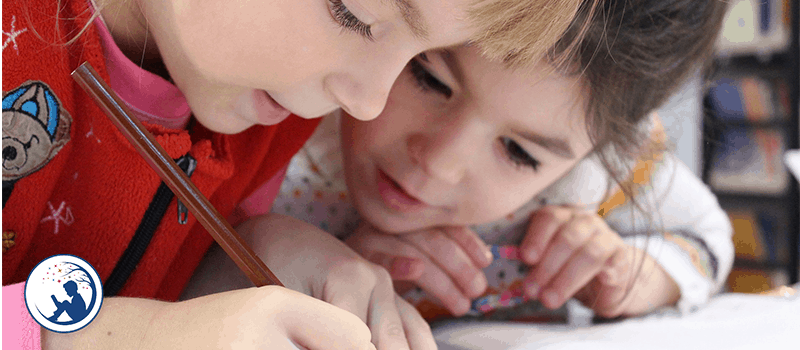Learning to read isn’t merely about reading books. For a child to fully grasp and absorb all facets of learning – reading included – it is vital to develop their ever-growing, sponge-like brains using a vast array of activities, tasks, and games, designed to help their grey matter work more efficiently, and, therefore, more effectively. In short, boosting their overall development is the quickest way to boost reading skills. So, in today’s article, we’re going to furnish you with five fun activities you and your seven-year-old can do together to get their highly-receptive neurons firing on all cylinders.
12 Activities To Boost Reading Skills and Development in Seven-Year-Olds
By the age of seven, it’s highly likely that your child will be reading independently. However, activities and games are still a fun and enjoyable way to enhance further their general league development, phonics skills, and word recognition. By the age of seven, youngsters are far more aware of the world around them – and the words in it. Therefore, it’s wise to take full advantage of this at every given opportunity, be it on a menu, road signs, posters, newspapers etc.
#1 – Language Games
Reading and reciting poetry is both fun and helps your child to ‘play’ with language and rhyming, broadens their vocabulary, and builds confidence when reading aloud. Therefore, suggesting poetry books is a prudent move. But ‘playing’ with language isn’t confined solely to poetry, encourage your child to play with language as much as possible – even if it results in sentence and words that don’t make much sense!
#2 – Phonics Games
Given that phonics skills are so integral to reading and the learning-to-read process, indulging in fun games that build phonics skills is a must! Doing word searches with your child (and perhaps even making your own up), playing games such as Boggle and Junior Scrabble, and asking your child to create words from letter cards are all fantastic ways to complement their school-based phonics learning.
#3 – Memory Games
Short- and long-term memory is vital for reading development as the more words a child can recognise and remember, the more quickly they’ll progress through their learning-to-read journey. Luckily, memory games can be played almost anywhere at any time, so if you’re ever stuck for something to do, why not test your child’s memory? You can do this any way you wish, but memorising menus in restaurants and cafes, directions to a relative’s or friend’s house, or to their favourite shops is a simple, yet effective way to test and boost their memory.
#4 – Listening Games
Listening and reading go hand in hand; therefore, improving your child’s listening skills will have a positive impact on their reading ability. Here are a few of our favourites:
– Draw a picture of an object or animal, then, without showing your child the drawing, describe what you’ve drawn. Ask them to draw what you’ve described. When they’ve finished, compare drawings.
– Create your own riddles or poems about objects, animals, or people (or anything else you like!), and see if your child can figure out who or what the riddle or poem is about.
– Make movements and sounds, then ask your child to copy exactly what you’ve done – but add on an extra movement or sound at the end. For example, you go hop, click your fingers, spin around in a circle, then say their name. They have to repeat it exactly and add on something extra at the end, and it’s then your turn to mimic them and add another movement or sound at the end. Carry on going until one of your forgets!
#5 – Action and Adventure Games
Learning and development aren’t just about staying inside and reading books; it’s also about getting out into the big wide world and learning there too! We’d be here for a very long time if we were to list all of the game you could play with your little one (!) but here are a few examples of some of what we think are the best:
Twister: Playing Twister involves listening, memory, and coordination, i.e. three exceptionally vital development skills; therefore, if you own the game or can afford to purchase it, we highly recommend it!
Charades: A classic game but one that encourages children to think about words and actions, and how they can use them to create and figure out clues.
Act The Word: Write down lots of ‘action’ words on pieces paper, such as jump, run, hop, skip, sit, etc. Ask your child to pick a word, read it aloud, then perform the action.
#6 – Creativity Games
Promoting creativity not only helps your son or daughter to become more creative within every aspect of learning; it also helps them to further their understanding of stories and characters in their books. Encourage your child to use puppets, toys, and models to create puppet shows; design posters, gifts, book covers, etc. using pens, pencils, paint, crayons, glitter, buttons, beads, straws etc., and to sure fridge magnets to leave you messages!
#7 – Technology Games
Although screen time should be limited, the use of technology shouldn’t be viewed in the same manner. Using technology is part and parcel of today’s world; therefore, it’s important to verse your child in how to use technology not only for educational purposes but also how it can help them in life. Educational tablets, PC or console games can be educational, so if you own or can afford to purchase any of the aforementioned bits of kit, it can be a worthwhile investment. Encourage your child to read the instructions before playing. Reading books and watching movies adaptations of said books is a fantastic way to combine technology and learning. Ask your child to discuss the differences between the book and the movie, and their opinions on which they preferred.
#8 – Car Games
Learning games and activities should be encouraged at all times – even in the car! Car journeys can often be lengthy; therefore, it’s wise to put this time to good use and suggest games your child can play. Play games such as ‘I Spy’, tell jokes, make up stories, riddles, and poems, encourage your child to read road signs and remember place names, or even help you read the sat nav!
#9 – ‘Everyday life’ Games
We learnt to read to ensure we can function in everyday, normal life; therefore, it’s crucial to get your child into the habit of interacting with the written world around them. Given that the world around is full of words and numbers, this is very easily achieved, but here are a few examples: Read newspaper articles, letters, school notices, leaflets, pamphlets, magazines together; ask your child to think about activities for the upcoming weekend and write a list of ideas, and when going on holiday encourage them to think about what they’ll need and to write a packing list.
#10 – Reading
An article dedicated to boosting reading skills wouldn’t be complete without reading being mentioned, so let’s see what reading-specific activities can help their development. By the age of seven, your child’s reading ability will be progressing readily; therefore, it’s imperative to complement their learning with activities at home. Although it can be easy to disregard picture books when your child reaches the age of seven, they’re still essential learning tools, so carry on reading pictures book and comics. Read to your child regularly or allow them to listen to audiobooks. By reading to them/allowing them to listen to audiobooks, you will help to expand their vocabulary as they’ll hear more words they’re unfamiliar with – particularly if you choose books that are slightly above their learning age.
#11 – Maths Games
Increasing your child’s skills in other areas of learning will help to boost their confidence, which will directly translate to how confident they feel when learning in general – including when learning to read. Many children often struggle with maths, so introducing games and activities to progress their understanding of numbers is a fantastic way to boost confidence.
#12 – Cooking
Cooking with your little one is a superb way to combine reading and maths practise all in one. Ask them to read the recipe, tell you how much of certain ingredients you need, count out certain ingredients – even get them involved in the cooking process. The more fun and enjoyable it is, the more beneficial it will be! Plus, you get a delicious treat to enjoy at the end of it!

